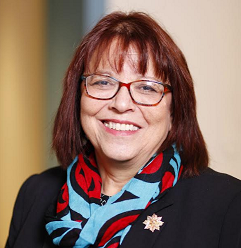Guest Opinion. Monday marks Indigenous Peoples’ Day, thanks to the tireless work of Indigenous advocates and allies who have worked to secure its recognition by municipalities, states, and the nation (although still not a federal holiday, Indigenous Peoples’ Day is a federally recognized holiday). Native Peoples were always here—at the time of contact—and now, thanks to the tenacity and resilience of our ancestors and the advocacy of our people today. When we celebrate Native heritage, cultures, traditions, and people today, we remember our ancestors’ many sacrifices and soberly reflect on the impact colonialism had on our people and our ways of living.

Of course, personally, as an Indigenous woman and President and CEO of the American Indian College Fund, every day is Indigenous Peoples’ Day for me. I grew up steeped in the Sicangu Lakota culture and traditions on the Rosebud Reservation in South Dakota. I raised my children in those traditions and they in turn are raising my grandchildren in our rich culture. My great-grandchildren are being raised in the culture. The circle continues. My family is a testament to our resilience as we honor and carry forward the ways of our ancestors.
Forty years ago, when I embarked upon my education career with the guidance of trusted Tribal elders and educators, it seemed almost fated that I would devote myself to lift others in Native communities as a teacher, tribal college president, and now as the president of the American Indian College Fund.
Today Native people are making headway and are earning rightful recognition in our nation, yet we still have a long way to go to be fully visible. Generations of political disenfranchisement, the removal from our sacred land, the removal of our children from our families, and the attempted elimination of our cultures and languages and erasure of us from history will take time to reverse.
The answer to creating greater visibility and success of Native people is education. The American Indian College Fund believes education is the answer to creating opportunities for Native students, their families, and communities, helping to pave the way for our children’s success. A college education uplifts graduates and their families while creating much-needed community leaders who serve as role models and offer hope that it is possible to make dreams a reality. In the process, an education ensures Native people are seen, heard, and valued.
But we also know the world is not always just. We have much work to do to create greater visibility of our students, welcoming learning environments, and a world that recognizes and honors the achievements, knowledge, and contributions Indigenous peoples have made throughout history and continue to offer.
We hope you will join us on our journey by supporting the American Indian College Fund, our students, and the 35 tribal colleges and universities that provide culturally based higher education for Native students. We also hope you will help us create greater visibility for our mission and Native peoples by reading a book by an Indigenous author, watching Native talent perform in television and movies, sharing the stories of our students’ successes with your friends and family, by attending our free virtual Indigebration Concert celebrating our mission and our students on November 1st, or by joining us for delicious Native cuisine at our Twin Cities EATSS Event November 10.
No matter what your interest, we have activities available to help create greater awareness of and greater opportunities for success for students, while giving you the opportunity to enrich your own understanding of our nation’s many Indigenous cultures and histories.
We look forward to you joining us in our work!
Cheryl Crazy Bull (Sicangu Lakota) has led the American Indian College Fund since 2012.
More Stories Like This
Law Should Not Get in the Way When "Manifest-ing Destiny"Celebrating 35 Years of Gaming Success
My Tribe’s ICE Contract Betrayed Our Values
Extending the Affordable Care Act Is a Moral Imperative for Indian Country
All Is Fair in … War?
Help us defend tribal sovereignty.
At Native News Online, our mission is rooted in telling the stories that strengthen sovereignty and uplift Indigenous voices — not just at year’s end, but every single day.
Because of your generosity last year, we were able to keep our reporters on the ground in tribal communities, at national gatherings and in the halls of Congress — covering the issues that matter most to Indian Country: sovereignty, culture, education, health and economic opportunity.
That support sustained us through a tough year in 2025. Now, as we look to the year ahead, we need your help right now to ensure warrior journalism remains strong — reporting that defends tribal sovereignty, amplifies Native truth, and holds power accountable.
 The stakes couldn't be higher. Your support keeps Native voices heard, Native stories told and Native sovereignty defended.
The stakes couldn't be higher. Your support keeps Native voices heard, Native stories told and Native sovereignty defended.
Stand with Warrior Journalism today.
Levi Rickert (Potawatomi), Editor & Publisher

